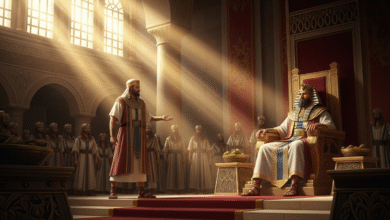The story of Jonah, peace be upon him: In the belly of the whale. A lesson in repentance, repentance and faith in God

In the annals of the prophets, the story of Yunus (peace be upon him), known as“Dhul Nun” (the owner of the whale), is one of the most impactful and instructive stories. It is a story that embodies the fact that prophets are human beings who err and strive, that God’s mercy extends to everything, and that the door of repentance and repentance is always open to anyone who sincerely turns to Him. From great distress in the depths of the sea to unbelievable relief, the story of Yunus is a constant reminder of the importance of admitting one’s mistakes, persistence in supplication, and the certainty that there is no refuge or escape from God except through Him.
The call of Jonah: The people of Nineveh and the departure in anger
God sent Yunus (peace be upon him) to his people in the city of Nineveh, Iraq, to call them to worship God alone and leave polytheism. Yunus called them for a long time, but his people disbelieved him, disobeyed him, and persisted in their polytheism. Yunus despaired of their faith, became angry with them, and thought that his people would never believe, and that his mission had ended with them.
In a moment of distress and anger, Yunus, peace be upon him, left his people without waiting for God’s explicit command to leave, or for God to inform him that none of them would believe. He made the mistake of thinking that the matter had been resolved and that they would be punished.
Evidence: The Qur’an mentions this unauthorized departure in its statement:
وَذَا النُّونِ إِذ ذَّهَبَ مُغَاضِبًا فَظَنَّ أَن لَّن نَّقْدِرَ عَلَيْهِ
(Surat al-Anbiya: 87).
That is, he thought that we would not harass him or punish him for what he did.
In the ship: Drawing lots and meeting the whale
After leaving his people, Yunus (peace be upon him) boarded a ship at sea. As the ship was traveling on the open sea, a great storm arose that almost sank the ship. The ship’s passengers said “There is a slave among us who has run away from his Lord, and we must throw him into the sea to save the ship.” They decided to cast lots to determine who this person was.
The lot was drawn, and it fell on Yunus, peace be upon him. They repeated it again, and it fell on him. They repeated it a third time, and it fell on him too. Yunus realized that this was God’s fate, and that what happened to him was because of his actions. Despite his status as a prophet, he did not reject God’s destiny, but threw himself into the sea.
Evidence: The Qur’an mentions this event in Surat al-Safat:
فَسَاهَمَ فَكَانَ مِنَ الْمُدْحَضِينَ (141) فَالْتَقَمَهُ الْحُوتُ وَهُوَ مُلِيمٌ (142)
(Surat al-Safat: 141-142).
The “underdogs” means: those who are defeated in the lottery, and “blameless” means: the doer of what is blamed.
The great whale, by God’s command, swallowed him up.
In the belly of the whale: Three Darknesses and a Great Prayer
Yunus (peace be upon him) found himself in superimposed darkness: The darkness of the whale’s belly, the darkness of the deep sea, and the darkness of the night. In this extreme distress, absolute loneliness, and impossible survival situation, Yunus fully realized that he had sinned against his Lord, and that he had no recourse but to Him.
In this darkness, Yunus supplicated to his Lord and called him with a great prayer, one of the greatest prayers for anguish and distress, a prayer filled with pure monotheism, confession of guilt, and praise to God Almighty.
Evidence: The Almighty said in Surat al-Anbiya:
وَذَا النُّونِ إِذ ذَّهَبَ مُغَاضِبًا فَظَنَّ أَن لَّن نَّقْدِرَ عَلَيْهِ فَنَادَىٰ فِي الظُّلُمَاتِ أَن لَّا إِلَٰهَ إِلَّا أَنتَ سُبْحَانَكَ إِنِّي كُنتُ مِنَ الظَّالِمِينَ
(Surat al-Anbiya: 87).
This prayer was a sincere repentance, a sincere remorse, an acknowledgment of God’s oneness, a confession of guilt, and a purification of God from all imperfection. Jonah continued to praise God in the belly of the whale.
Evidence: The Almighty said in Surat al-Safat:
فَلَوْلَا أَنَّهُ كَانَ مِنَ الْمُسَبِّحِينَ (143) لَلَبِثَ فِي بَطْنِهِ إِلَىٰ يَوْمِ يُبْعَثُونَ (144)
(Surat al-Safat: 143-144).
This verse shows that Jonah’s continued praise and supplication was the reason he was saved from perishing in the belly of the whale.
Surviving and returning to his people: Grace and forgiveness
God Almighty answered Yunus’ prayer and ordered the whale to cast him ashore. Yunus was thrown on the seashore, he was weak and sickly, but he survived by a divine miracle.
Evidence: The Almighty said in Surat al-Safat:
فَنَبَذْنَاهُ بِالْعَرَاءِ وَهُوَ سَقِيمٌ (145) وَأَنبَتْنَا عَلَيْهِ شَجَرَةً مِّن يَقْطِينٍ (146)
(Surat al-Safat: 145-146).
Thanks to God’s mercy, He planted a pumpkin tree to shade him from the sun and nourish him with its fruits. After he recovered, God brought him back to his people.
Here is another miracle. While Jonah was in the belly of the whale, torment descended on his people, and they saw its signs and realized that they had lied to their prophet. They all repented to God and went out into the desert, praying, crying, and asking for forgiveness. When God saw the sincerity of their repentance, He lifted the torment from them.
Evidence: The Almighty said in Surah Yunus:
فَلَوْلَا كَانَتْ قَرْيَةٌ آمَنَتْ فَنَفَعَهَا إِيمَانُهَا إِلَّا قَوْمَ يُونُسَ لَمَّا آمَنُوا كَشَفْنَا عَنْهُم عَذَابَ الْخِزْيِ فِي الْحَيَاةِ الدُّنْيَا وَمَتَّعْنَاهُمْ إِلَىٰ حِينٍ
(Surah Yunus: 98).
Jonah returned to them and found that his people had believed. He rejoiced in their faith and continued to call and guide them.
Epilogue: Great Lessons in Repentance and Certainty
The story of Yunus (peace be upon him ) is one of the greatest stories that teaches Muslims unforgettable lessons in:
- The importance of repentance and repentance: No matter how great the sin or mistake, the door to repentance is always open, and God accepts repentance from His servants. Yunus’ prayer, “There is no god but You, glorified be You, I was one of the unjust” is the key to relief for every distressed person.
- Confidence in God’s ability and mercy: Even in the deepest darkness and despair, joy appears out of nowhere, for God is able to do everything, and His mercy is vast.
- Do not despair of God’s mercy: Even if a person thinks there is no way out, God’s mercy and help are closer to him than he realizes.
- The consequences of rushing and not fully authorizing: The story teaches us that prophets are human beings who make mistakes, and that rushing to make judgments or decisions without an explicit divine command may lead to consequences.
- The value of praise and remembrance: Tasbih was the reason for Jonah’s survival, and it is proof that constant dhikr and supplication saves us from peril.
- God’s mercy is vast: God removes punishment from nations if they sincerely repent, and this opens the door of hope for all sinners.
The story of Yunus (peace be upon him) is a living testimony that the way back to God is always easy, that sincere repentance, sincere supplication, and firm faith are the keys to deliverance from all distress, and that God is more merciful to His servants than to abandon them if they turn to Him.
What is the most important lesson that the story of Jonah has left you with after reading it in such detail?




